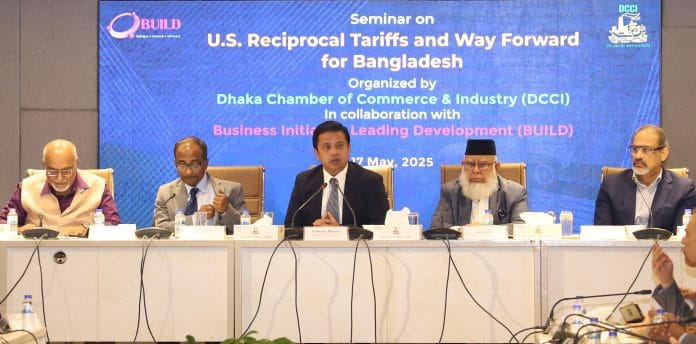Business leaders and policymakers have called for an immediate and strategic diplomatic response to the recent imposition of a 37% U.S. tariff on Bangladeshi exports, warning that the move—currently suspended for 90 days—poses a serious threat to the country’s largest export market and ongoing labor and sustainability reforms.
At a seminar titled “U.S. Reciprocal Tariffs and the Way Forward for Bangladesh”, organized by the Dhaka Chamber of Commerce & Industry (DCCI) in collaboration with BUILD on Saturday, they also emphasised policy reforms to protect and sustain export sectors alongside diversifying trade partners and reducing over dependence on a single market to overcome the challenge right now.
“We must consider both immediate and long-term solutions, such as expanding non-traditional markets, expediting FTAs, deep and strategic economic diplomacy, improving competitiveness through technology and skill development and addressing long-standing issues in our trade facilitation system,” DCCI President Taskeen Ahmed said.
“Above all, a concentrated private and public sector-led approach and strategies are essential to deal this tariff challenge in no time,” he added.
Addressing the seminar, Commerce Secretary Mahbubur Rahman said: “Bangladesh is very much positive in terms of reducing trade deficit with the USA by increasing the import of goods and services from the USA. After the imposition of tariff by the US government, Bangladesh has been engaging with them without delay and we are responding in a right way.”
Regarding cotton import from the USA, he also said a warehouse can be set up in Bangladesh to expedite Bangladesh’s cotton import from USA. A long-term LNG import agreement has been made with the United States, which will increase bilateral trade between the two countries by almost $1 billion. The issue of importing U.S. goods and services from third countries will be presented in the first discussion session of negotiation, so that they treat it as direct import.
Presenting the keynote paper, Dr. Debapriya Bhattacharya, distinguished fellow, Centre for Policy Dialogue (CPD), noted that every crisis has made a new opportunity and this tariff war will also create an opportunity like industry relocation that Bangladesh can cash in on.
The economist thinks that the extra tariff will ultimately impact the consumers and they will have to bear the extra cost.
Dr. Debapriya noted that the tariff issue is geopolitical as much as economic and urged inclusion of service trade in future negotiations. He warned of consumer backlash in the U.S. and highlighted the need for multi-dimensional private sector involvement.
Dr. M. Masrur Reaz, Chairman of Policy Exchange of Bangladesh, suggested charting the political economy of the U.S.A. first and taking a well preparation before react. He said that Bangladesh’s import demand of cotton, soybean and LNG is continuously increasing, so bilateral talks with the US should continue including these products for win-win benefits. He later emphasized on enhancing the capacity of logistics sector of Bangladesh to increase our competitiveness in the long run, because our logistics cost is relatively higher than the neighbouring countries.
Md. Mezbaul Haque, executive director of the Bangladesh Bank, said that the tariff shock will create a price war that will lead to the need of increasing efficiency and cost reduction. He later said that the supply of money in the market is quite good now, but the pressure on the banking system is increasing due to more reliance on banks to meet the financial needs of the industry. If the structural efficiency of the financial market is not ensured, financial management stability will not come, he opined.
Other speakers, including leaders from the ICCB and the BTMA, highlighted the urgency of cost-efficiency, logistics improvements, and ensuring energy supply to maintain production competitiveness. Suggestions included enhancing U.S. cotton access, strengthening financial market structures, and accelerating business environment reforms.
The seminar concluded with a consensus on the need for swift, strategic, and inclusive measures to mitigate the tariff’s impact and safeguard Bangladesh’s export-led growth.

